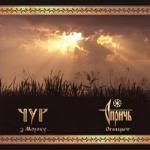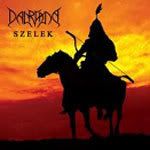
Artist: Equilibrium (Germany)
Album Title: Sagas
Label: Nuclear Blast (Germany, USA)
Released: 2008 (June)
Hailing from the German state of Bavaria, Equilibrium has been around since 2001, when the band formed with the original intention to play a single show. Fortunately for us, they were encouraged by the positive reception to continue on, and so far have graced us with two great albums. Their debut, Turis Fratyr, was released in early 2005 on the German label Black Attakk, and gained them a pretty large fanbase considering the album became very difficult to find. I myself had to obtain it from Germany earlier this year, as an addition to my Menhir Hildebrandslied order. Appearances at festivals and such also helped spread the word about Equilibrium, and eventually that word reached the ears of large metal label Nuclear Blast, who signed the band to a contract and have exposed them to a much larger audience with the release of their sophmore album, Sagas.
Sagas is a huge album. In pretty much every possible way. Not only does it hover around the 80-minute mark (without any filler or unusual stretches of silence), but almost every one of those 80 minutes is very high on the intensity scale (somewhere between "epic" and "ridiculously epic," to be exact). They fly through the material, barely giving the listener time to catch his or her breath, and causing the 80 minutes to pass by quickly. Sagas consists of 13 tracks, including a brief instrumental somewhere in the middle, and a long (16 minute) instrumental closing out the album. Equilibrium's music can be described as extremely epic folk metal with lots of synths, German lyrics about Bavarian tales and such, and vocals that range from "black metal style" to "sort of death metal style." Despite the heavy use of synthesizers, the band's talent should not be overlooked, as these guys are quite good at what they do. You sometimes have to pay special attention in order to hear it past the soaring keyboard melodies and choir sounds, but there's a strong metal backbone behind the bombast.
Despite the fact that they are an extreme metal band with shrieking and growling vocals, Equilibrium doesn't try to sound menacing. Indeed, they're about as frightening as Gargamel from The Smurfs. The atmosphere of the album, instead, is one of adventure and fun. It's kind of difficult to be frowning while listening to Sagas. Grimacing, on the other hand, may be possible at times, depending on how you react to the some of the stranger moments on the album. Take, for example, the track "Unbesiegt," which sounds like it could have been a collaboration with "The Rhythm Is Gonna Get You"-era Gloria Estefan. I'm not sure what Latin percussion and jungle animal sounds have to do with European folk metal, but the song is actually pretty good once you get past that. Then there's the song "Snüffel," an ode to snuff (of course), which features ZZ Top riffs and, even weirder, the sound of an automobile engine roaring at one point in the track. These moments are signs that Equilibrium does not care about being taken completely seriously, and the lyrics and the overall playful atmosphere of Sagas supports this. Sure, because of this Equilibrium can't really be appreciated on the same level as more "serious" pagan metal bands such as Menhir, Moonsorrow, or Falkenbach, but, when you're in the mood for it, it's refreshing and very enjoyable.
Even if you can't get into "Unbesiegt" or "Snüffel" (you're not alone), there's still another 65-70 minutes of music on Sagas, and most of the tracks here are winners. There's a lot of very strong material on the album, and it's spread throughout the entire length of the CD. This isn't one of those albums that drops off in quality after the first few tracks. Even the long instrumental that closes the album, "Mana," is great. There are choirs, a violin, and even a panpipe on this final track, so even if (like me) you don't generally care for instrumentals, don't write this one off until you give it a chance.
Although Sagas is generally getting very positive reviews so far, it has its detractors. Many of its critics cite the saccharine-sweetness of many of the album's melodies and overall "uplifting" sound of the album (as well as its inherent folk-metalness) as critical failings of Sagas. I wouldn't necessarily recommend Sagas to those who feel that metal should always be menacing and dark. I would also imagine some pagan metal purists might dismiss it as major-label dilution and exploitation of the genre. Maybe that's true; I don't know. But I really enjoy Sagas; maybe not on the same level as I enjoy the latest Arkona or Moonsorrow albums, but, at least on a musical level, this is one of the strongest (and most fun) releases I've heard all year. Definitely give it a try.


